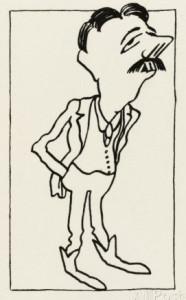 How to Live on 24 Hours a Day is, in many ways, as quaint and dated as it sounds, but Arnold Bennett’s 1910 booklet is also gloriously short, less than 30 pages. In its brevity, tone, and candor it can be called a creepily prescient forerunner to today’s how-to ebooks. The slim volume is meant to enrich readers’ lives by encouraging them to cultivate a life of the mind through a regimen of study and thought implemented during evening hours they otherwise spend socializing, pipe smoking and various white pursuits of early 20th century Britain. This is a solid suggestion, no doubt, but Bennett offers it with a compelling, often overlooked argument based on the democratic nature of time. He writes:
How to Live on 24 Hours a Day is, in many ways, as quaint and dated as it sounds, but Arnold Bennett’s 1910 booklet is also gloriously short, less than 30 pages. In its brevity, tone, and candor it can be called a creepily prescient forerunner to today’s how-to ebooks. The slim volume is meant to enrich readers’ lives by encouraging them to cultivate a life of the mind through a regimen of study and thought implemented during evening hours they otherwise spend socializing, pipe smoking and various white pursuits of early 20th century Britain. This is a solid suggestion, no doubt, but Bennett offers it with a compelling, often overlooked argument based on the democratic nature of time. He writes:
Yet it has been said that time is money. That proverb understates the case. Time is a great deal more than money. If you have time you can obtain money – usually. But though you have the wealth of a cloak-room attendant at the Carlton Hotel, you cannot buy yourself a minute more time than I have, or the cat by the fire has. …
… You wake up in the morning, and lo! your purse is magically filled with twenty-four hours of the unmanufactured tissue of the universe of your life! It is yours. It is the most precious of possessions. A highly singular commodity, showered upon you in a manner as singular as the commodity itself!
For remark! No one can take if from you. It is unstealable. And no one receives either more or less than your receive. (1)
The certainty and pride with which Bennett doles out his advice that people should read and ponder books at night can be annoying, but some of this is just the style of his day. On the whole, Bennett comes off as deeply concerned with the time squeeze facing the modern worker who spends two hours in commute and eight hours a day and “begins his business functions with reluctance, as late as he can, and he ends them with joy as early as he can.” (7) Enlivening the mind when it is not rented to others is Bennett’s primary concern and, for him, the only way to truly be alive and escape what he calls the “uneasy doze” of day-to-day drudgery. (5)
Surprisingly, Bennett is not snobbish when it comes to which subjects and topics people decide to pursue in their mental yoga. Whatever blows your hair back, he advises, offering gently that poetry is more challenging than prose and, somewhat hilariously given a hundred years of perspective, that E.B. Browning is a better writer than the Brontes or Jane Austen.
Bennett stresses not only to read, but to think, while warning against becoming a pedantic “prig,” lording the life of the mind over everybody. He also advises against becoming a slave to your reading and thinking regimen and to avoid at all costs being overly ambitious, lest you become overwhelmed and give up altogether. “A programme of daily employ is not a religion,” he writes. (23)
How to Live on 24 Hours a Day is a clear forerunner to today’s deluge of how-to booklets, covering narrow topics in a conversational style. It rises above the common herd, however, in that the topic he chooses is, for him, utterly serious. It’s not just about how to get smarter. From Bennett’s point of view he is prosthelytizing about what he considers life itself. In line with the classical philosophy of the day, Bennett believes a life of the mind is real life, and anything less a mere impostor.
The most prescient part of the work is the preface, in which Bennett attempts to appease readers who were offended by his generalization that people did not enjoy or live a life of the mind during their daily working hours. Though noting such critics are a minority, Bennett offers some special advice for this group. (He tells them to incorporate the reading and thinking regimen in the morning before work, avoiding doing it at night when they’re tired from daily mind exertions.) In this way, he is arguably a forerunner of the interactive how-to book in that, more than simply doling out advice, he is interacting with and adjusting to his audience.
Still, he was a man of his time, and a well-off one at that, writing for other well-off white men. He addresses the issue of “food, and servants” by directing his readers to instruct a servant “whoever she may be” to leave two biscuits, water, tea leaves and a spirit lamp on a tray near the bed at night. He then gives instructions on how to boil water.
Maybe, like boiling water, living a life of the mind is something everybody knows how to do, but the idea of writing something utilitarian, short and conversational makes Bennett relevant more than 100 years after How to Live’s publication. The little book is part of the public domain now can be gotten in digital format for free.